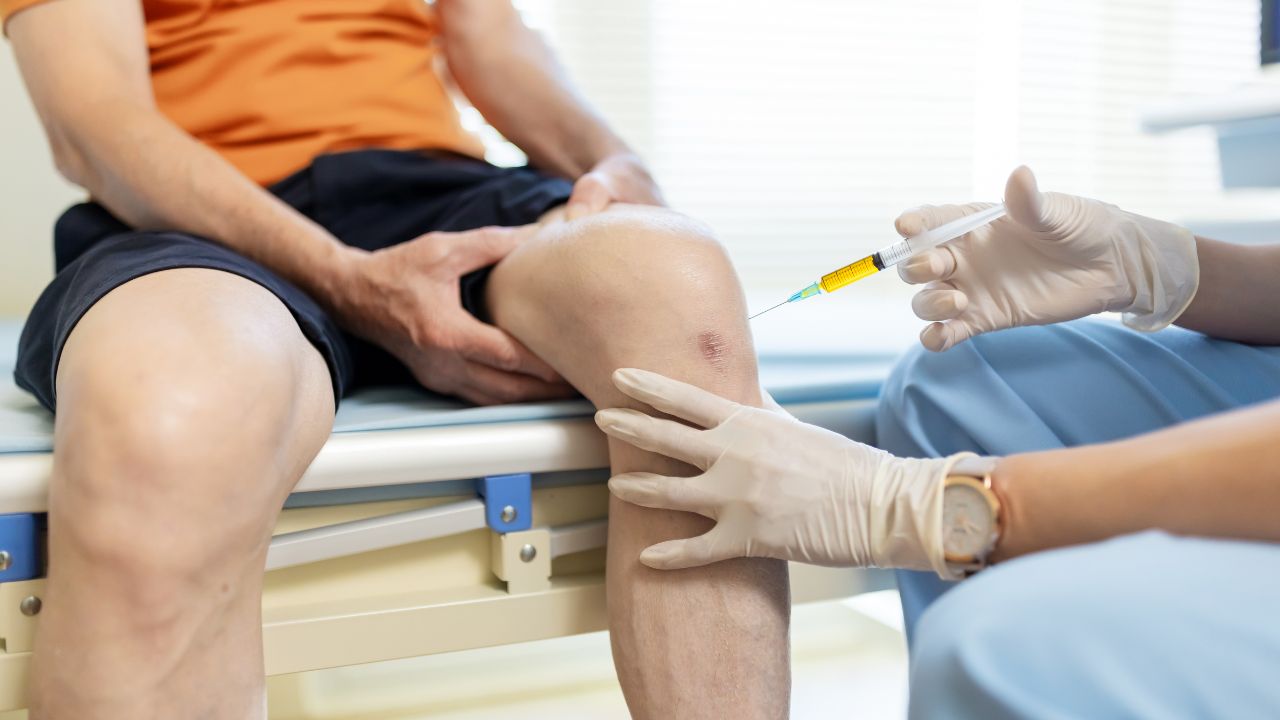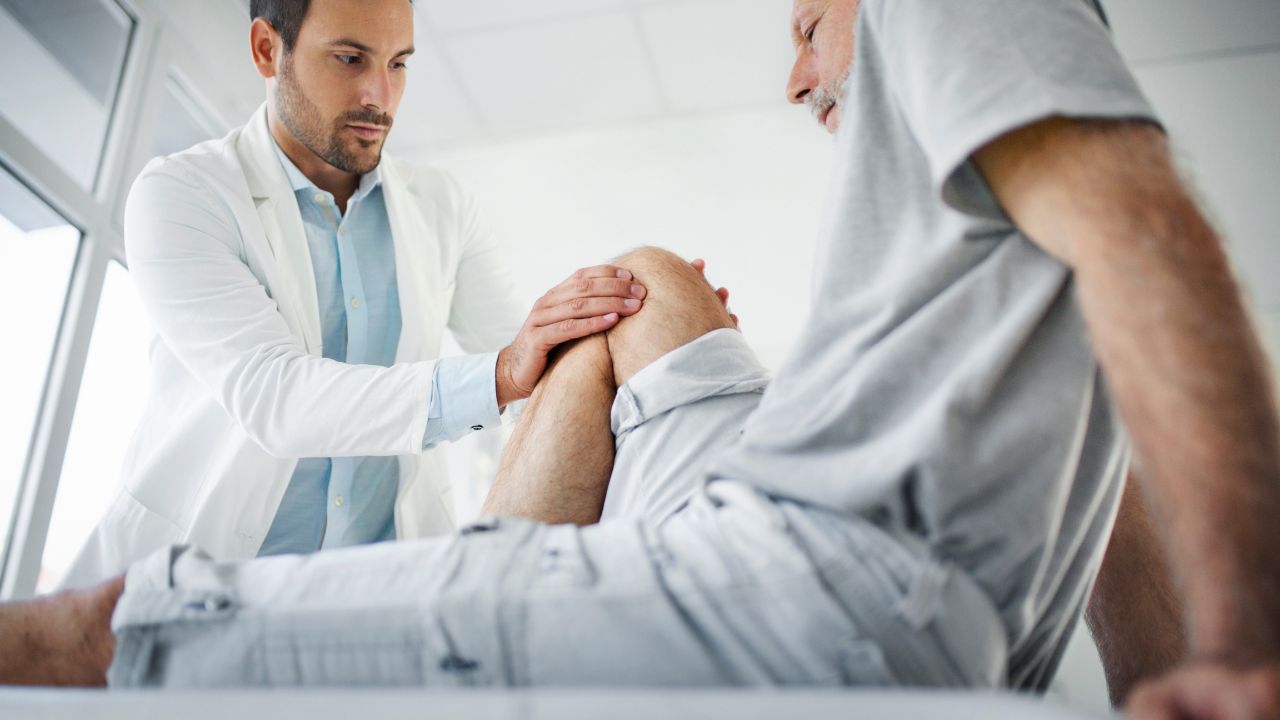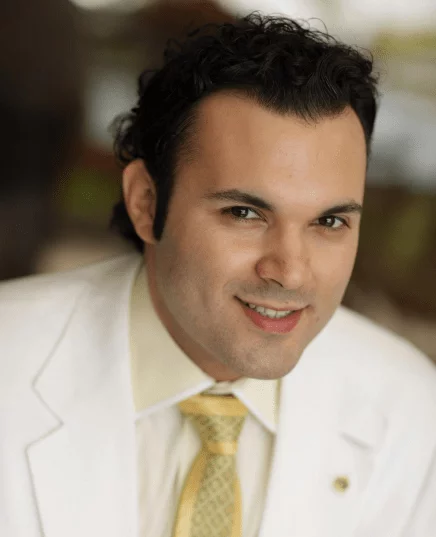CALL US NOW +1-844-669-0939

PRP For Knee Joints
Are you suffering from knee joint pain? You should consider PRP injection therapy for your knees. PRP Treatment Beverly Hills offers knee injections, medical consultations, relief from joint pain, tendonitis, osteoarthritis, and more.
More than 10% of people are thought to have knee osteoarthritis (OA), with a lifetime risk of 45%. Osteoarthritis (OA) is a common degenerative joint disease that affects the cartilage, bone, and other tissues in the joints. It is also known as degenerative knee arthritis or degenerative joint disease. As the cartilage degrades in osteoarthritis, the affected joints experience pain, stiffness, and a loss of mobility.
PRP for knee joints is a great addition to osteoarthritis treatment options and other orthopedic conditions. Platelet-Rich Plasma (PRP) is a concentrated solution of platelets and growth factors derived from the patient’s own blood. PRP injections can stimulate healing as well as decrease pain and improve ones quality of life.
Uses of PRP therapy
PRP treatment has a range of uses, including treating musculoskeletal injuries such as tendon, ligament, muscle, and joint injuries, accelerating healing after surgery, and managing osteoarthritis. It can also be used as sports medicine for sports injuries, including pulled muscles, joint sprains, tennis elbow, and ligament tears.
How does PRP Injection for knees work?
PRP preparations for knees involve using the patient’s own blood to heal the knee joint. The patient’s blood is taken, then processed in a centrifuge. The platelets and growth factors in the blood are separated using a centrifuge. After that, the knee joint is injected with the obtained solution.
Growth factors are critical molecules that can promote tissue development, repair, and regeneration. These factors have shown promising results in pre-clinical settings for regenerative medicine applications. By interacting with blood cells and the surrounding extracellular matrix, growth factors can regulate cellular processes such as proliferation, differentiation, and wound healing.
Platelet concentration in the blood contains growth factors that can trigger cell proliferation, speed healing, and stimulate tissue regeneration. Platelet-rich plasma (PRP) treatments can encourage the growth of new cells to aid in the repair of damaged joint tissue and lessen pain and inflammation.
Researchers have also explored the potential of encouraging joint’s skeletal stem cells to start along a path toward becoming bone but stop the process at the cartilage stage.
How long do PRP injections last in the knee?
Based on clinical studies, Platelet-rich Plasma treatment has been shown to be useful for up to nine months. Research shows that using LR-PRP injection can help treat patellar tendinopathy, and PRP injection can help treat plantar fasciitis (pain in the ligaments connecting the heel to the front of the foot) and pain in the donor site in patellar tendon graft BTB ACL reconstruction.
What is the success rate of PRP injections for knees?
The success rate of PRP injections for knees is approximately 80%, with an average length of pain relief of 9-12 month follow-ups, according to Cleveland Clinic Florida. Results become clinically significant after 6 to 12 months and may require additional injections at the doctor’s direction. PRP injections provide better results compared to other injectable options and may help manage pain associated with knee OA.
Can I walk after the PRP injection in the knee?
In general, it is encouraged to walk after a PRP knee injection as long as the pain from the injection is minimal. During the first week, it is recommended to keep walking to under a mile, but after that, walking can be increased as tolerated.
However, if the injection was in the hip, knee, ankle, or foot and there is discomfort, it may be necessary to use crutches to walk. Strenuous activity should also be avoided for 1-2 weeks after the injection.
In cases where a specific tendon was injected, running or heavy weightlifting should be avoided for the first two weeks to prevent the PRP from being pushed out of the tendon. Pain relief measures such as ice, heat, over-the-counter NSAIDs, or prescription pain relief may also be used as recommended by a doctor. There are usually no side effects due to prp injection of the knee but one may experience some pain at the injection site as well as bruising.
How many PRP injections are needed for the knee?
The suggested regimen is 3 PRP injections spaced one month apart, followed by maintenance injections every 6 months. For up to 12 months, it can offer symptomatic relief from arthritis and knee pain.

Does PRP injection work for osteoarthritis of the knee?
Studies have shown that Platelet-Rich Plasma therapy may be effective in treating pain, improving the healing process, and improving joint function in osteoarthritis patients. PRP is derived from the patient’s own blood and is injected directly into the affected joint.
Early research indicates that PRP may help modulate the joint environment, reduce inflammation, and possibly slow, halt, or even repair damage to the cartilage. However, more research is needed to understand the effectiveness of PRP injections for osteoarthritis fully.
Specifically, studies have shown that some types of PRP treatment may be effective in improving low-to-moderate-grade knee osteoarthritis.
Is PRP injection for the knee safe?
PRP injections may be able to treat a variety of musculoskeletal injuries and conditions like chronic tendon injuries and knee osteoarthritis. While PRP uses one’s own blood and is likely to be safe, injections into the knee joint can entail risks such as local infection and pain at the injection site.

Though PRP appears to be effective in treating certain conditions, more scientific evidence is needed to determine its overall effectiveness in other conditions. Therefore, the safety of PRP injection for the knee depends on individual circumstances and medical supervision.
What are the risks of PRP injection for the knee?
The risks of PRP therapy for the knee include bleeding, tissue damage, infection, and nerve injuries. Additionally, there are risks from the injection itself, such as pain at the injection site and the possibility of local infection and nerve damage. However, when the platelets used in the injection are taken from the patient, there is no risk of allergies or cross-infection than with other anti-inflammatory medications like corticosteroids.
What is the time interval for PRP injection in the knee?
To achieve the best result, treatment can be given through monthly injections for three consecutive months. Most meniscus tears may require at least 2 to 3 PRP injections every 1 to 2 weeks to get positive outcomes. You may require up to 3 injections of platelet-rich plasma within a six-month period, usually performed two to three weeks apart. However, you may be able to achieve significant to complete relief after the first or second shot.
How much does PRP injection cost?
PRP injections cost, on average, $1,075, with a range of $399 to $3,000, depending on the provider’s location, credentials, and extent of the treatment plan. Knee injections of PRP can cost anywhere from $500 to $1,200 per treatment. The cost of a single PRP treatment ranges from $500 to $2,500, with the possibility of requiring repeat treatments. The cost per injection ranges from $750 to $850, and some healthcare insurance companies may cover full or partial payment for the procedure.
Does PRP work for knee cartilage?
PRP may lessen inflammatory reactions and slow the articular cartilage’s deteriorative remodeling process, which both have the potential to improve knee function.
Hyaluronic acid or PRP?
The use of hyaluronic acid (HA) or platelet-rich plasma (PRP) injections are two nonoperative treatment options for knee osteoarthritis (OA) that aim to provide symptomatic relief and help delay surgical intervention.
While there are mixed clinical outcomes for PRP when compared with HA, recent research has demonstrated that PRP injections can improve joint pain and function in patients with mild to moderate knee arthritis.
In a study evaluating the efficacy of PRP combined with HA injections versus HA injections alone, PRP was found to be a beneficial addition in managing knee OA. Therefore, while both treatments have their own benefits, PRP may be a better option for some patients.
Is PRP therapy a placebo?
A study claimed that the effect of platelet concentrates goes beyond the mere placebo effect and that PRP injections can provide better results than other injectable options over time.
Are PRP injections FDA-approved?
Although the equipment used to produce PRP and the injections themselves have been cleared by the FDA, PRP injections are considered investigational and have not been officially approved by the FDA for most uses. The FDA has only approved the usage of PRP in bone graft treatments. However, physicians may use the treatment to address a variety of other health issues. Since PRP is derived from the patient’s own blood, it is not considered a drug.
PRP injection for knees near me
PRP Treatment Beverly Hills offers the best PRP injection for knees near me in Beverly Hills but can also come to your home or office throughout the Los Angeles area. We serve patients near Beverly Hills, Bel Air, West Hollywood, Santa Monica, West Los Angeles, Culver City, Hollywood, Venice, Marina del Rey, Malibu, Manhattan Beach, Redondo Beach, Downtown Los Angeles, Encino, Woodland Hills, Sherman Oaks, Calabasas, Burbank, Glendale, Hidden Hills, Agoura Hills, Northridge, North Hollywood, Topanga, Canoga Park, Reseda, Valley Glen, Chatsworth, West Hills, Winnetka, Universal City, Silverlake, Echo Park, and many more.
References:
1. Rodríguez-Merchán EC. Intra-Articular Platelet-Rich Plasma Injections in Knee Osteoarthritis: A Review of Their Current Molecular Mechanisms of Action and Their Degree of Efficacy. Int J Mol Sci. 2022 Jan 24;23(3):1301. doi: 10.3390/ijms23031301. PMID: 35163225; PMCID: PMC8836227.
2. Le ADK, Enweze L, DeBaun MR, Dragoo JL. Current Clinical Recommendations for Use of Platelet-Rich Plasma. Curr Rev Musculoskelet Med. 2018 Dec;11(4):624-634. doi: 10.1007/s12178-018-9527-7. PMID: 30353479; PMCID: PMC6220007.
3. Filardo G, Previtali D, Napoli F, Candrian C, Zaffagnini S, Grassi A. PRP Injections for the Treatment of Knee Osteoarthritis: A Meta-Analysis of Randomized Controlled Trials. Cartilage. 2021 Dec;13(1_suppl):364S-375S. doi: 10.1177/1947603520931170. Epub 2020 Jun 19. PMID: 32551947; PMCID: PMC8808870.
4. Kennedy MI, Whitney K, Evans T, LaPrade RF. Platelet-Rich Plasma and Cartilage Repair. Curr Rev Musculoskelet Med. 2018 Dec;11(4):573-582. doi: 10.1007/s12178-018-9516-x. PMID: 30203333; PMCID: PMC6220001.
5. Tischer T, Bode G, Buhs M, Marquass B, Nehrer S, Vogt S, Zinser W, Angele P, Spahn G, Welsch GH, Niemeyer P, Madry H. Platelet-rich plasma (PRP) as therapy for cartilage, tendon and muscle damage – German working group position statement. J Exp Orthop. 2020 Sep 3;7(1):64. doi: 10.1186/s40634-020-00282-2. PMID: 32885339; PMCID: PMC7471237.
6. Belk JW, Kraeutler MJ, Houck DA, Goodrich JA, Dragoo JL, McCarty EC. Platelet-Rich Plasma Versus Hyaluronic Acid for Knee Osteoarthritis: A Systematic Review and Meta-analysis of Randomized Controlled Trials. Am J Sports Med. 2021 Jan;49(1):249-260. doi: 10.1177/0363546520909397. Epub 2020 Apr 17. PMID: 32302218.
7. Filardo G, Previtali D, Napoli F, Candrian C, Zaffagnini S, Grassi A. PRP Injections for the Treatment of Knee Osteoarthritis: A Meta-Analysis of Randomized Controlled Trials. Cartilage. 2021 Dec;13(1_suppl):364S-375S. doi: 10.1177/1947603520931170. Epub 2020 Jun 19. PMID: 32551947; PMCID: PMC8808870.
As Seen On
As Featured on Extra TV

Author: David Nazarian M.D.
Dr. David Nazarian is certified by the American Board of Internal Medicine and specializes in platelet-rich plasma therapy and the role growth factors play in the healing process. Dr. Nazarian closely monitors the medical literature regarding PRP and its potential use in the treatment of certain medical conditions such as hair loss, orthopedics, sports injuries, joint pain, erectile dysfunction, dermatology, acne scars, dark under eyes, tendonitis and more. There are many clinical trials and research being done on the use of platelet-rich plasma that show promising results. We look forward to meeting you and discussing if this therapy can help your specific condition.
Contact Us
Dr. David Nazarian
9301 Wilshilre Blvd Suite 405,
Beverly Hills, CA, 90210
Phone: 1-844-669-0939
Email: info@prptreatmentbeverlyhills.com
